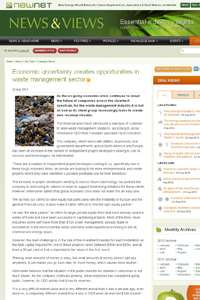Economic Uncertainty Creates Opportunities in Waste Management Sector
 As the ongoing economic crisis continues to cloud the future of companies across the cleantech spectrum, for the waste management industry it is not all bad as its client group increasingly looks to create new revenue streams. As the ongoing economic crisis continues to cloud the future of companies across the cleantech spectrum, for the waste management industry it is not all bad as its client group increasingly looks to create new revenue streams. The financial woes have introduced a new type of customer to seek waste management solutions, according to Jesse Klinkhamer, CEO of Canadian specialist Klean Industries. The company, which works with utilities, businesses, and government departments across North America and Europe, has seen an increase in the number of independent project developers looking to use its services and technologies, he told NewNet. ‘There are a number of independent project developers coming to us, specifically now in these tough economic times, as people are looking to be more entrepreneurial and create projects where they have identified a possible profitable use for their feedstock.’ The increase in project developers wanting to source Klean’s technology has pushed the company to start using its network in order to support fundraising initiatives for these clients. However, Klinkhamer admits that the global economic crisis does not make this an easy task. ‘We do help our clients to raise equity but particularly with the instability of Europe and the general financial crisis, it does make it rather difficult to find the right equity partner.’ He said ‘the ideal partner’ refers to larger private equity firms that have already raised a series of funds and have been successful in capitalizing on projects. Most of the firms Klean Industries works with have more than $1 Billion under management, already made investments in the environmental sector, and have some experience investing in the oil, chemical, and energy space. However, the main challenge is in the size of the investment needed for each installation as the total capital required for one of these projects varies between $30m and $50m, and at least 30% to 40% of that is expected to be raised in the first round. ‘Raising small amounts of money is easy, but small amounts of money don’t get you anywhere, it just makes you go back sooner than later for more money, which causes more dilution.’ Klinkhamer believes that the situation in the public markets for cleantech companies is not much easier. As the company continues growing, Klean Industries has considered going public, however, its CEO admits that it has its reserves. ‘It is a very difficult marketplace and a very different animal than it was a decade ago, even more so, a completely different animal than it was in 2008 when oil reached $140 a barrel.’ He backs up his argument by saying that compared to approximately 160 IPOs in 2007 on the US markets, there were 21 IPOs in 2008, and in 2011 there were less than half a dozen. He said, ‘in the energy sector it has become difficult to raise the kind of following amount you want as a public company.’ Nevertheless, Klean Industries expects that this scenario will change in the next 12 to 18 months, which may give some hope for cleantech companies wanting to test the public markets. The article was written by Daniela Jaramillo and can be read in full at NewNet Article |
You can return to the main Company News page, or press the Back button on your browser.

